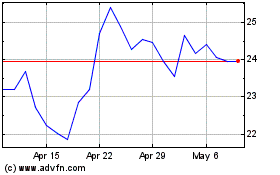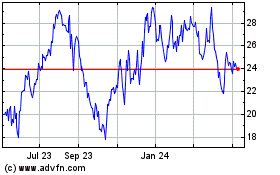BERLIN—German Chancellor Angela Merkel said Sunday she will run
for a fourth term next year, launching her re-election campaign at
one of the most challenging times the chancellor has seen in her 11
years in office.
Ms. Merkel seeks to lead the conservative ticket at the next
general election in the fall of 2017, she told reporters after
announcing her decision to leaders of her Christian Democratic
Union in Berlin.
"I have thought about it endlessly," Ms. Merkel said. "After 11
years, the decision about a fourth candidacy is anything but
trivial for the country, the party and for me personally."
The chancellor will also run for a new term as CDU chairman next
month. Her nomination as candidate for chancellor still needs to be
approved at a joint meeting of the CDU and its sister party, the
Christian Social Union.
Ms. Merkel's candidacy ends months of speculation within her own
party, which widely expected her to run again as there is no clear
alternative candidate who could fill her shoes.
"She has no choice now," said Frank Decker, political scientist
at the University of Bonn. "Changing horses so close to the
election simply would have left her party in great distress."
The chancellor acknowledged that she would enter an election
campaign that will be tougher than any of the three previous
contests.
"We will face opposition from all sides," Ms. Merkel said,
citing both populist and left-wing opponents at home and abroad who
"threaten our values and way of life in Germany."
"I know exactly how to continue, it's not about correcting
anything," she said when asked about her motivations to run
again.
Ms. Merkel, 62 years old, has faced growing pressure to combat
populist forces and is in the middle of tackling what observers
have referred to Germany's biggest challenge in postwar history:
The integration of a record number of migrants.
Her decision last year to let in nearly one million asylum
seekers sparked deep discontent among Germans, letting the
populist, anti-immigration Alternative for Germany score record
wins in recent state elections that sets that party up to enter the
federal parliament in elections next year.
While Ms. Merkel will have to deter angry voters from turning to
populists, she is still in a better position than most other
mainstream political leaders in Europe who are hoping to be
re-elected.
A poll from Emnid for daily Bild on Sunday showed that 55% of
Germans want her to run again while 39% are against a new term.
That is down from an approval rating of more than 70% in the summer
of 2015, according to pollster Infratest Dimap. Her CDU party is
polling in the low-30% range, after winning 41.5% of the vote in a
2013 federal election.
In France, polls predict nationalist presidential contender
Marine Le Pen will easily enter the first round of elections in the
spring of 2017. In Austria, polls show an anti-immigration
candidate winning next month's presidential election and in Italy,
the center-left premier Matteo Renzi could lose a constitutional
referendum next month.
Pressure on Ms. Merkel to run again grew after the election of
Donald Trump as U.S. president earlier this month. Western leaders
and commentators described her as a stabilizing force for liberal
democratic values in the wake of Britain's vote to leave the
European Union and Mr. Trump's victory.
U.S. President Barack Obama praised Ms. Merkel during a visit to
Berlin last week and called on Germans to vote for her. On Friday,
Ms. Merkel received the leaders of the U.S., France, Italy, Spain
and the U.K. to discuss international crises in the post-Trump
world.
Ms. Merkel said that while she felt flattered by the role
ascribed to her in the wake of political changes in the U.S., she
also found it "absurd." "No person, no matter how experienced, can
turn everything to good," Ms. Merkel said.
Despite clashes that erupted inside the CDU and CSU over the
migrant crisis, most party members back her as the candidate.
"Angela Merkel's strength is to bring people together even in
tough times," said Julia Kloeckner, deputy chairwoman of the
CDU.
The election campaign is likely to put pressure on Germany's
ruling grand coalition in the coming months at a time when the CDU,
the CSU and the center-left junior partner, the Social Democratic
Party, have been struggling to agree on central issues such as how
to integrate the newcomers into the country.
"Not to be underestimated but neither unbeatable, nor savior of
the free world," Ralf Stegner, deputy chairman of the SPD wrote of
Ms. Merkel on Twitter. The SPD, which has been polling in the
low-20% range, has yet to settle on a candidate, which many
speculate will be Deputy Vice-Chancellor Sigmar Gabriel.
AfD leaders are still fighting over who should be the party's
first candidate for federal elections.
"Germany can't afford a new term for Angela Merkel—2017
elections will be decisive for our future," party co-head Frauke
Petry wrote on Twitter. Polls predict the party winning more than
10% next year, above the 5% needed for a party enter the federal
parliament.
Stefan Lange contributed to this article.
Write to Ruth Bender at Ruth.Bender@wsj.com
(END) Dow Jones Newswires
November 20, 2016 20:45 ET (01:45 GMT)
Copyright (c) 2016 Dow Jones & Company, Inc.
Kohls (NYSE:KSS)
Historical Stock Chart
From Aug 2024 to Sep 2024

Kohls (NYSE:KSS)
Historical Stock Chart
From Sep 2023 to Sep 2024
